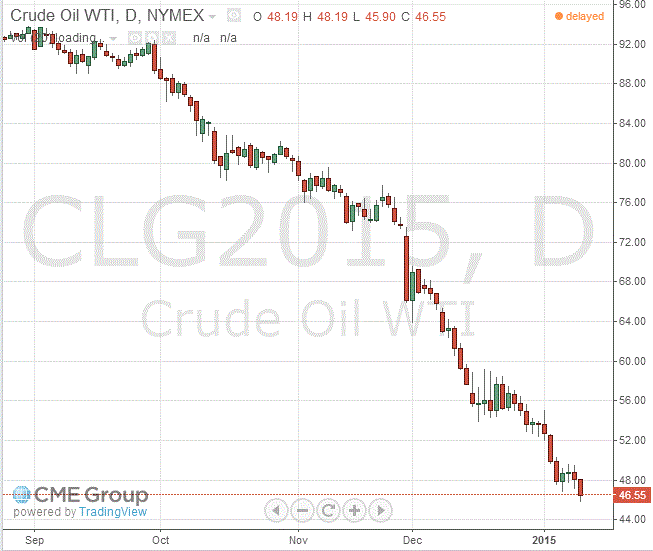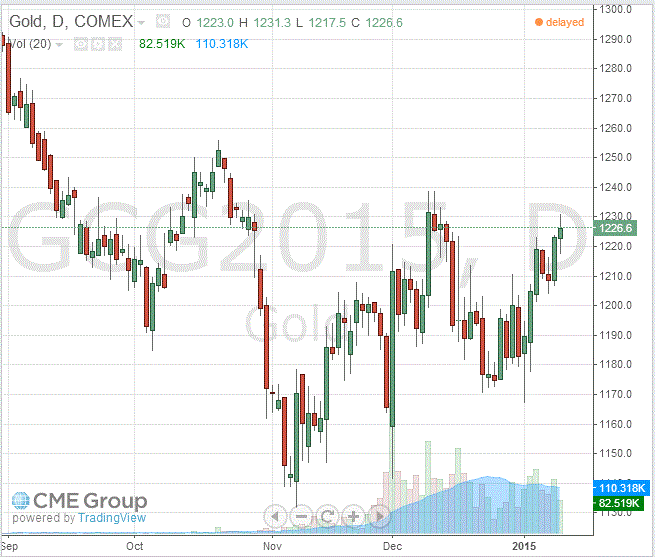Noticias del mercado
-
17:40
Oil: a review of the market situation
The price of oil continued to decline today, reaching with nearly six-year low, which was associated with the decision of Goldman Sachs and Societe Generale cut its short-term outlook for oil prices.
As it became known, experts Goldman Sachs downgraded the outlook for the cost of WTI crude oil for the next three months, up to $ 41 per barrel to $ 70 per barrel, the forecast for Brent - up to $ 42 from $ 80 per barrel.
Meanwhile, Societe Generale analysts downgraded the outlook for the entire cost of Brent in 2015 from $ 70 to $ 55 per barrel, WTI - from $ 65 to $ 51 per barrel.
"The deterioration forecasts two largest banks strengthened those fears that have been dipped quotes on their current level, - said the expert Jean MakDzhillian Tradition Energy. - The market still struggles to find the bottom, but the bottom where it remains a mystery to all."
Earlier, analysts Bank of America Merrill Lynch released a forecast, which states that in the short term, Brent will fall in price to $ 40 per barrel. According to experts, the cost of the US WTI crude oil falls to $ 35 per barrel. All this will lead to what will have to cut production or Saudi Arabia or countries outside of OPEC, said in a note ..
Meanwhile, Venezuelan President Nicolas Maduro said that OPEC should find a consensus with other oil producers and to develop a common strategy to support the oil market and stabilize the situation in the global economy. During his visit to Iran, he said that in order to achieve economic equilibrium required return of oil prices to the level of $ 100 per barrel
However, a member of the royal family of Saudi Arabia Al-Waleed bin Talal said that oil prices are unlikely to rise again to $ 100 per barrel. "If the offer will remain at the same level and consumption will be low, we should expect further fall in oil prices. But if the market will lose part of the proposal, while consumption will grow somewhat, prices can go up. But I'm sure that we'll never see oil at $ 100 I said a year ago that the price of oil over $ 100 artificial "- he said in an interview.
The cost of the February futures on US light crude oil WTI (Light Sweet Crude Oil) dropped to 46.55 dollars per barrel on the New York Mercantile Exchange.
February futures price for North Sea Brent crude oil mix fell $ 1.55 to $ 47.88 a barrel on the London Stock Exchange ICE Futures Europe. Earlier, futures touched $ 49.66, the lowest level since April 29, 2009.
-
17:20
Gold: A review of the market situation
Gold prices recovered, while closer to the month high, due to the fall in US stock indices, as well as a slight weakening of the US dollar.
Falling bond yields caused the dollar index to retreat from the daily high. Yields on 10-year US securities decreased by 2.9 bp to 1.94%, and 2-year bonds - by 1.6 bp up to 0.561%. Meanwhile, DJIA and S & P are falling on the background of the collapse of the shares of energy companies. Precious metal may continue to grow, if the fall in stock markets will trigger risk aversion.
Market participants also monitored on the dynamics of the oil market. "Low oil prices tend to adversely affect the gold, but prolonged drop in prices raises concerns that further losses will have a detrimental effect on the financial markets and oil-exporting countries. This creates demand for gold as a safe asset," - said analyst HSBC James Steele.
Gold futures in recent days have been supported, as political uncertainty in Greece and concerns about the impact of falling oil prices on the global economy led investors to buy the precious metal. Some investors buy gold, believing that in turbulent times, it is better to retain its value than other assets.
Stocks of the largest gold ETF-secured fund SPDR Gold Trust on Friday rose 0.42 percent to 707.82 tons.
Increase in the price of gold also helps to increased demand in the physical markets, particularly in China on the eve of the New Year according to the lunar calendar, which is celebrated in February. Margins on the Shanghai Gold Exchange held at the level of last week's $ 05.04 per ounce.
The cost of the February gold futures on the COMEX today rose to 1226.60 dollars per ounce.
-
14:52
Goldman Sachs cut its oil price forecasts
The U.S. investment bank Goldman Sachs cut its oil price forecasts on Monday. The bank expects Brent price of $50.40 a barrel in 2015, down from an earlier forecast of $83.75, and WTI price of $47.15 per barrel in 2015, down from an earlier forecast of $73.75.
Goldman Sachs lowered its 2016 Brent price forecast to $70, down from $90, and WTI price to $65, down from $80.
On a 3-, 6- and 12-month basis, the bank sees Brent to be at $42, $43 and $70 respectively, down from $80, $85 and $90.
The WTI price is expected to be at $41, $39 and $65 on a 3-, 6- and 12-month basis, down from $70, $75 and $80 a barrel.
Oil prices have dropped more than 50 percent since mid-2014, reaching their lowest levels since 2009.
-
12:20
Oil: Prices extend falls as Goldman Sachs cuts forecast for 2015
Brent crude and West Texas Intermediate slumped on Monday trading at 5-1/2-year lows, the lowest since April 2009 and were negative for the last straight seven weeks. Brent Crude lost -2.71%, currently trading at USD48.75.27 a barrel. West Texas Intermediate declined by -2.30% currently quoted at USD47.25 as Goldman Sachs cut its 2015 price forecast foreseeing rising global supplies. Goldman Sachs does not see Saudi Arabia or any other major OPEC members to cut output rates in 2015 revising previous forecasts that the OPEC might do so. Societe Generale also cut its oil price forecast for 2015 citing a build up in oil storage and inventories in the first half of this year. Fires in refineries in Ohio and Pennsylvania over the weekend were further weighed on demand
The global glut continues in 2015 and a low global demand weighs amid record output from U.S. shale drillers. Both major brands lost more than 50% of their value since mid-2014 but the OPEC, responsible for 40% of worldwide oil-production, decided to leave output-rates unchanged around 30 million barrels a day.
-
12:00
Gold intraday at four-week high
Gold prices declined slightly in today's session with the precious metal currently quoted at USD1,221.90, -0,06% a troy ounce. Intraday gold climbed to a four-week high at USD1,230.90 as the rout in oil-prices continued and market participants expect the Federal Reserve to keep benchmark interest rates unchanged for a longer-than-expected period after mixed U.S. job data on Friday. Data showed that the average hourly earnings fell in December by the most since records began in 2006. On the other hand the Labor Department reported 252,000 newly created jobs beating forecasts of 240,000. Gold was further supported by the upcoming Greek elections on January 25th. A win of the anti-austerity party Syriza could result in an exit from the currency bloc.
GOLD currently trading at USD1,221.90
-
10:20
Press Review: Oil prices extend falls; Goldman Sachs slashes forecasts
REUTERS
Oil prices extend falls; Goldman Sachs slashes forecasts
(Reuters) - Global oil prices fell by more than $1 a barrel on Monday as Goldman Sachs lowered its short-term forecasts, while refineries in Ohio and Pennsylvania were hit by fires over the weekend, curtailing demand for crude in the United States.
Both Brent and U.S. crude are at their lowest since April 2009 and have fallen for seven straight weeks.
Analysts at Goldman Sachs cut their average forecast for Brent in 2015 to $50.40 a barrel from $83.75. They lowered their forecast for U.S. crude to $47.15 a barrel from $73.75, saying it would need to stay near $40 for most of the first half of 2015 before it would hold up shale oil investments.
Source: http://www.reuters.com/article/2015/01/12/us-markets-oil-idUSKBN0KL03Y20150112
BLOOMBERG
ECB Weighs Bond Purchases Up to 500 Billion Euros to Juice Economy
European Central Bank staff presented policy makers with models for buying as much as 500 billion euros ($591 billion) of investment-grade assets, according to a person who attended a meeting of the Governing Council.
Various quantitative-easing options focused on government bonds were shown to governors on Jan. 7 in Frankfurt, including buying only AAA-rated debt or bonds rated at least BBB minus, the euro-area central bank official said. Governors took no decision on the design or implementation of any package after the presentation, according to the person and another official who attended the meeting. The people asked not to be identified because the talks were private.
BLOOMBERG
Japan Plans Record Budget to Help Economy Hit by Recession
Japan plans a record budget for next fiscal year to support an economy that fell into recession after Prime Minister Shinzo Abe's government increased the sales tax.
Government ministers and the ruling coalition parties approved the 96.34 trillion yen ($814 billion) budget proposal for the 12 months starting April 1 at a meeting in Tokyo today, Finance Minister Taro Aso told reporters.
Japan, fighting to rein in the world's heaviest debt burden, will see tax revenue rise to the highest level in 24 years while new bond issuance declines to the lowest since 2008. Abe's already boosted public works spending and support for small businesses through a supplementary budget for the current year.
-
00:31
Commodities. Daily history for Jan 9’2015:
(raw materials / closing price /% change)
Light Crude 48.21 -0.31%
Gold 1,216.10 0.00%
-


